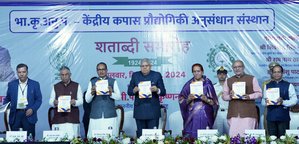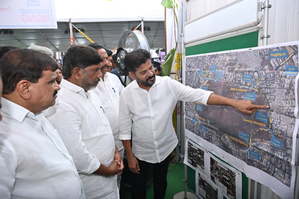Delhi records AQI of 274, air quality continues to remain ‘poor’
New Delhi, Dec 3 (IANS) The national capital continued to suffer from toxic air, with the average Air Quality Index (AQI) in Delhi recorded as ‘poor’ on Tuesday.
According to the Central Pollution Control Board (CPCB), the average AQI of Delhi-NCR was at 274 points till 7:30 a.m.
In eight areas of the city, the AQI level remained between 300 and above 400 — 305 in Bawana, 307 in Jahangirpuri, 325 in Mundka, 304 in Nehru Nagar, 303 in RK Puram, 302 in Rohini, 342 in Shadipur, 306 in Siri Fort.
While in other and most areas of Delhi, the AQI level remained between 200 and above 300 — Alipur (272), Anand Vihar (293), Ashok Vihar (285), Chandni Chowk (249), Mathura Road (235), Dr Karni Singh Shooting Range (293), DTU (265), Dwarka Sector 8 (299), IGI Airport (257), Dilshad Garden (262), ITO (235), Jawaharlal Nehru Stadium (250), Lodhi Road (232), Major Dhyanchand Stadium (271), Mandir Marg (262), Najafgarh (237), Narela (260), North Campus DU (261), NSIT Dwarka (252), Okhla Phase 2 (278), Patparganj (271), Punjabi Bagh (252), Pusa (248), Sonia Vihar (289) and Sri Aurobindo Marg (238).
In the Delhi NCR region, Faridabad remained at 255 points, Gurugram at 222, Ghaziabad at 181, Greater Noida at 195, and Noida at 162.
According to CPCB, an AQI between 0 and 50 is considered ‘good’, 51-100 ‘satisfactory’, 101-200 ‘moderate’, 201-300 ‘poor’, 301-400 ‘very poor’, 401-450 ‘severe’, and above 450 ‘severe plus’, as per the CPCB.
In response to the alarming situation, the Supreme Court has directed the enforcement of all measures under Stage 4 of the Graded Response Action Plan (GRAP-4), except those related to the closure of schools.
GRAP-4 mandates strict restrictions on construction activities, industrial emissions, and other pollution-intensive practices. The court has expressed concern over lapses in the implementation of these guidelines and has warned that officials responsible for such failures will face legal consequences.
Authorities have implemented several restrictions under GRAP-4, including a ban on the entry of non-essential trucks into Delhi, except those carrying essential goods or running on cleaner fuels such as LNG, CNG, BS-VI diesel, or electricity.
Construction activities for public infrastructure projects have also been suspended to curb dust pollution, a major contributor to the current crisis.
–IANS
sd/




